The Union of Palestinian Women Committees Society’s Ties to the PFLP Terror Group
Introduction
Founded in 1980, the Union of Palestinian Women Committees Society (UPWC – originally Union of Palestinian Women Committees) states that its mission is “to empower Palestinian women on all levels and to contribute in the Palestinian national struggle against the Israeli military illegal occupation of the Palestinian territories.” According to a 2012 article published in Haaretz, UPWC “operates 21 preschools and day-care centers in the poorest communities in the West Bank.”
UPWC supports “the boycott of occupation in all forms, including economic, cultural, academic and all other forms of boycott” and rejects any normalization with Israel calling it “treason.”
As documented in this report, UPWC has multiple links to the PFLP terrorist organization. On October 22, 2021, the Israeli Ministry of Defense declared UPWC a “terror organization” because it is part of “a network of organizations” that operates “on behalf of the ‘Popular Front’.”
The Popular Front for the Liberation of Palestine
Founded by George Habash in 1967, the PFLP is a secular Palestinian Marxist-Leninist terror group, originally supported by the former Soviet Union and China. The PFLP is a designated terrorist organization by the US, EU, Canada, and Israel and is involved in suicide bombings, shootings, and assassinations, among other terrorist activities targeting civilians. It is well-known for hijacking commercial airlines in the 1960s and 1970s, as well as targeting civilians in Europe, the Middle East, and Africa, and is responsible for countless deaths and injuries.
The PFLP assassinated Israeli Minister of Tourism Rechavam Ze’evi in 2001. In 1976, its members joined with the Baader-Meinhof Gang (a West German terror group) to hijack an Air France Tel Aviv-bound flight, diverting it in Entebbe, Uganda. In 2011, PFLP members took credit for the brutal murder of the Fogel family, including a baby and two young children. The PFLP was also responsible for the 2014 massacre at a synagogue in Jerusalem’s Har Nof neighborhood, murdering four worshipers and an Israeli Druze police officer. In August 2019, a PFLP terror cell carried out a bombing against Israeli civilians, murdering 17-year-old Rina Shnerb, and injuring her father and brother.
The PFLP has never recognized the State of Israel, and opposes all negotiations, instead calling for the “liberation” of all of “historical Palestine,” regularly by means of terror.
Funding
UPWC’s terror affiliation is antithetical to human rights norms and principles. Due to its affiliation with the PFLP, the provision of funds to UPWC is in likely violation of international, EU, and domestic terror financing and material support laws. The organization is therefore an inappropriate partner for governments and individuals seeking to further human rights in the region.
- UPWC does not publish financial information, reflecting a lack of transparency and accountability. Partial information is available from other sources. (See table below for further funding information.)
- In 2019-2022, UPWC is an implementing partner of a project titled “Comprehensive Protection of the Palestinian Population in East Jerusalem.” The project received €449,735 (2020-2022) from the Spanish Agency for International Development Cooperation (AECID) and €799,362 (2019-2021) from the Basque Agency for Development Cooperation (AVCD). Other implementing partners for the project include Addameer, Defense for Children International – Palestine (DCI-P), and the Jerusalem Legal Aid and Human Rights Center (JLAC).
- In 2018-2019, the Basque Agency for Development Cooperation granted UPWC (via the Spanish NGO Mundubat) €184,252 for “psychosocial support to Gazan women and minors.”
- In 2015-2018, the Basque region (Basque Agency for Development Cooperation via the Spanish NGO Mundubat) granted UPWC €800,764 for “strengthening community resistance and Palestinian social cohesion in east Jerusalem” as part of its Kanan project.
- The Kanan project is dedicated to strengthening “the social and political participation channels of the Palestinian population in East Jerusalem through enhancing the capacity of the youth.” It is implemented by six NGOs, including UPWC, Health Work Committees (HWC), Defense for Children International–Palestine (DCI-P), Alternative Information Center (AIC), and Bisan Center for Research and Development Association,1 all of which have reported ties to the PFLP terror group.
- In 2018-2019, the Basque Agency for Development Cooperation granted UPWC (via the Spanish NGO Mundubat) €184,252 for “psychosocial support to Gazan women and minors.”
- In 2017-2019, the European Commission granted €699,236 to UPWC for “strengthening community resilience and social cohesion in East Jerusalem on both sides of the separation wall.” The project included Mundubat and five Palestinian NGOs recipients, including DCI-P, HWC, and the Bisan Center for Research and Development Association.
- In 2016-2019, UPWC received NOK 50.5 million (approximately €5 million) from Norway (via Norwegian People’s Aid) for a project “Partnership for democratic development in Palestine.” The project is being implemented by 11 NGO partners, including the Union of Agricultural Works Committee (UAWC), a Palestinian NGO identified by Fatah as an official PFLP “affiliate” and by USAID as the “agricultural arm” of the PFLP.
- In 2015, Spain (Spanish Agency for International Development Cooperation – AECID) granted €83,200 to UPWC for “Improvement of participation in public spaces for Palestinian women.”
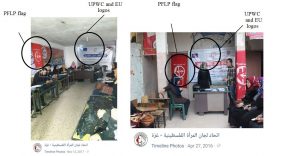
The PFLP terror group logo is seen next to the EU and UPWC logos at a workshop to support female participation in elections. (Source: Union of Palestinian Women’s Committees, Facebook, November 12, 2017: https://www.facebook.com/AthadLjanAlmratAlflstynyt/posts/1690065831011734?__tn__=-R)
UPWC’s Organizational Ties to the PFLP
- UPWC is identified by Fatah as a PFLP “affiliate” and by a USAID-engaged audit as the “PFLP’s women’s organization.”
- On October 22, 2021, the Israeli Ministry of Defense declared UPWC a “terror organization” because it is part of “a network of organizations” that operates “on behalf of the ‘Popular Front’.”
- In her book Gender and the Israeli-Palestinian Conflict: The Politics of Women’s Resistance, Simona Sharoni explains that “women favoring the platform of the Popular Front for the Liberation of Palestine (PFLP) founded the Union of Palestinian Women’s Committees (UPWC).”
- On March 21, 2018, UPWC Vice President Suhair Khader stated that UPWC is the PFLP’s “feminist framework.”
- In September 2019, UPWC organized a conference with the PFLP’s Kaid Al-Ghul who spoke about “his experience in political work since joining the Arab nationalist movement in 1967 when he was 17 years old, during which he was active in the vanguard of popular resistance.” The conference took place in cooperation with Norwegian People’s Aid (NPA).
- On September 24, 2019, UPWC reported that Israeli security forces “stormed” their headquarters in Hebron, seizing computers and other devices. UPWC posted several photos of the incident on its Facebook page as well.
- In 2012, Israeli security forces reportedly “confiscated seven computers, four hard drives, camera memory cards, an external hard drive and a projector” from UPWC’s They also took “posters of George Habash, the deceased leader of the Popular Front for the Liberation of Palestine” and “60 children’s T-shirts that bore the name Ghassan Kanafani, a Palestinian writer born in Acre who served as one of the PFLP’s spokesmen.”
- UPWC also regularly honors PFLP terrorists. For example, in 2018, UPWC held a seminar in commemoration of the PFLP founder George Habash, “on the importance of reconciliation and ending the division as a means of liberation and confronting the enemy.” The same year, UPWC posted a message commemorating “the fortieth anniversary of the martyrdom” of the terrorist Dalal Mughrabi, a terrorist who in 1978 murdered 37 civilians, including 12 children (see Appendix I).
Selected UPWC Staff Members with Ties to the PFLP
Numerous UPWC staff members have ties to the PFLP terror group.
Khitam Saafin: UPWC President.2
- In 2017, Khitam Saafin was arrested by Israeli security forces.
- In November 2020, Saafin was arrested and placed in administrative detention. According to Addameer, her detention was extended multiple times. In July 2021, the administrative detention order was cancelled following an indictment being brought against her that charged her with “holding a position and participating in meetings in an organization deemed illegal under Israeli military orders, along with participating in public and national events.” As of October 27, 2021, Saafin is still awaiting trial.
- In May 2019, Saafin attended a memorial event organized by the PFLP. It centered on PFLP political bureau member Rabah Muhanna, who, according to information posted by the PFLP, “contributed to the establishment” of several PFLP-affiliated NGOs. The hall was decorated with PFLP paraphernalia.
- In a July 2017 statement published by the PFLP, the terrorist organization “confirmed that the Zionist occupation forces launched a pre-dawn campaign of raids across the occupied West Bank of Palestine on Sunday, arresting a number of leaders and activists of the Front, led by the Palestinian Legislative Council member Khalida Jarrar, feminist activist Khitam Saafin and former prisoner Ihab Massoud, as well as a number of activists in al-Khalil” (emphasis added). The PFLP also “urged the Palestinian masses to escalate the popular movement to support the struggle of the brave prisoners in Israeli jails, for Jarrar and Saafin and the prisoner Muhammad Allan, on hunger strike for 25 days.”
- The PFLP has referred to Saafin as a “comrade.”
Suhair Khader: UPWC Vice President.3
- According to the PFLP, Suhair Khader is “a member of the Central Committee of the Popular Front for the Liberation of Palestine.”
- In a March 2018 article on the PFLP’s website, Khader stated that the “retrieving of our stolen rights and the realization of our national and struggle project, which is first and foremost embodied in the right of return – the essence of the conflict between us and the Zionist enemy thief– can only be through the crystallization of a mass of pressure and severe masses flowing to the return camps” (emphasis added). Khader further “stated the need to strengthen women’s participation and the need for them to advance to the front rows and to continue their fighting actions. Moreover, she called for arming oneself with the motivation and determination until retrieving our national rights, embodied in the right of return and the liberation of every centimeter of occupied Palestine” (emphasis added).
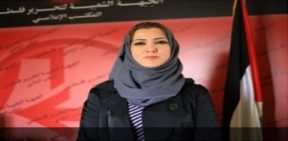
Photo of Suhair Khader on PFLP Website with PFLP flag in the background. (Source: PFLP, “Khader: We call for intensifying the participation of women in the march of return as an essential partner in the struggle,” March 29, 2018)
Samira Abdel-Alim: UPWC coordinator in Rafah, Gaza.4
- According to the PFLP, Abdel-Alim is a member of the sub-committee of the Central Committee of the PFLP.
- In July 2021, the Palestinian Bar Association referred to Abd Al-Alim as the “Popular Front’s Head of Women affairs framework.”
- In September 2017, the PFLP held an activity in which it visited its “Head of Women affairs comrade Samira Abd Al-Alim.”
- In 2015, Samira Abdel-Alim participated in a symposium “In Support of Our Heroes” that called for the “support and aid to the cause of the prisoners in the prisons of the Zionist enemy.” The symposium was co-organized by the “International Campaign for Solidarity with the national commander Comrade Ahmad Saadat,” the PFLP Secretary-General.
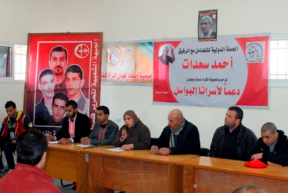
Photo of Samira Abdel-Alim on the PFLP Website, taken during a symposium “In Support of Our Heroes,” hosted at UPWC’s Headquarters (Source: PFLP, “Solidarity Campaign with Leader Sa’adat Organizations a Symposium in Rafah entitled in ‘Support of Our Heroes,’” February 26, 2015)
Maha Nassar
- According to an October 2013 statement published by UPWC on the PFLP’s website, Nassar, who died in 2008, “contributed to the foundation of the Union of Palestinian Women’s Committees in 1980, elected as its president in 1994, and was reelected twice afterwards.”
- According the statement, Nassar “was one of the first people who founded the Popular Front Organization” at Birzeit University. According to the same statement, she also served as a “member in the Assembly” of the Palestinian NGO Woman’s Affairs Technical Committee (WATC).5
- In the statement, UPWC claims that “her actions have always preceded her words, like those of Shadia Abu Ghazaleh and Dalal Al Moghrabi and all Palestinian women martyrs” and that “Comrade Maha’s visible role in the first and second Intifada is well known to the Palestinian people.”
- In 1978, Dalal Mugrabi, a Palestinian terrorist, murdered 38 civilians, including 13 children in the Coastal Road Massacre.
- Shadia Abu Ghazaleh is referred to by the PFLP as a “comrade.” The PFLP website notes that she was “one of the original members of the Popular Front for the Liberation of Palestine” and “one of the first Palestinian women to be involved in military resistance in the post-1967 era.” According to the PFLP, “She participated in and led several military operations carried out by the PFLP before the accidental detonation of a bomb in her home. Today, her name is immortal as a struggler, a leader, and a fighter in the history of the Palestinian people and the people of the world.”
- The PFLP refers to Nassar as a “comrade,” “role model,” and “icon of national and democratic struggle.”
- The PFLP also refers to her as “a leading Palestinian feminist” and “member of the Central Committee of the PFLP.”
Dalia Nassar: Maha Nassar’s (above) daughter, Dalia Nassar also appears to be a UPWC member6 and representative.7 She serves as UPWC coordinator for the Kanan Project (see above).8
- She has been described as “one of the first women to participate in clashes with the IDF alongside the men.”
- An October 2015 interview with Dalia Nassar in Alaraby states that “her mother was a member [sic] the Popular Front for the Liberation of Palestine, a leftist political party” and quotes Dalia Nassar stating that “I am proud of my mum and I want to follow in her footsteps.”
Ismat Shakhshir: UPWC member9 /and official10 in Nablus.
- Shakhshir, according to her CV, is also a “member of the director committee” of the Health Work Committees, an organization with ties to PFLP. According to an “All 4 Palestine” article, she is also a board member of the Union of Health Work Committees, an organization with ties to the PFLP.
- Shakhshir ran “for the PLC [Palestinian Legislative Council] seat at the 2006 election representing the PFLP but did not pass.”
- In 2019, Shakhshir participated in a ceremony co-organized by UPWC and the Progressive Student Action Front, “the student organization of the Popular Front for the Liberation of Palestine,” in honor of the International Women’s Day.
- The banner for the ceremony featured logos of UPWC, the Progressive Student Action Front, and the PFLP terrorist and plane hijacker Leila Khaled.

UPWC and Progressive Student Action Front Ceremony with banner of Leila Khaled (Source: PFLP, “The Student Action Front and the Union of Women’s Committees honor the active and successful student,” March 11, 2019)
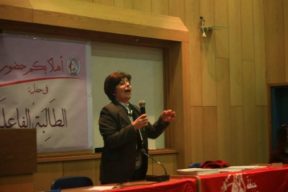
Photo of Ismat Shakhshir during the ceremony in honor of the International Women’s Day. (Source: PFLP, “The Student Action Front and the Union of Women’s Committees honor the active and successful student,” March 11, 2019)
- In 2017, Shakhshir participated in a workshop, “The boycott of Israeli goods and its impact on the normalization,” co-organized by UPWC and the Progressive Student Action Front.
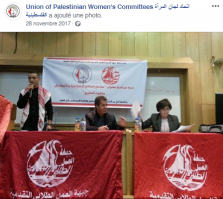
Photo of Ismat Shakhshir during a workshop “The boycott of Israeli goods and its impact on the normalization” (Source: Union of Palestinian Women’s Committees Federation, Facebook, November 28, 2017)
- In 2015, Shakhshir participated in a seminar “Detention experiences and human rights during detention, interrogation and trial” co-organized by UPWC, the Progressive Student Action Front, and Addameer – an organization identified by Fatah as an official PFLP “affiliate.”
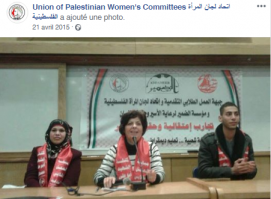
Photo of Ismat Shakhshir during a workshop “Detention experiences and human rights during de-tention, interrogation and trial” (Source: Union of Palestinian Women’s Committees, Facebook, April 21, 2015)
UPWC’s Incitement of Children
- According to UPWC, the organization supervises the “Ghassan Kanafani” educational project for young children. Kanafani was a “leading member of the Popular Front for the Liberation of Palestine.”
- The Ghassan Kanafani Project’s 2017 preschool graduation ceremony program included “solidarity with our brave prisoners” and children dressed in military uniforms and holding PFLP signs:
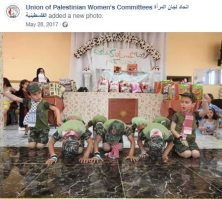
Pictures of the festivities marking the end of the 2017 Ghassan Kanafani project. The pictures are published on UPWC’s Facebook account and feature children wearing uniforms or T-shirts of Kanafani. One child is seen lying down on the floor with a gun. Others are dancing around with knives. One picture also presents children holding a poster of what appears to be PFLP prisoners. (Source: Union of Palestinian Women’s Committees, Facebook, May 29, 2017)
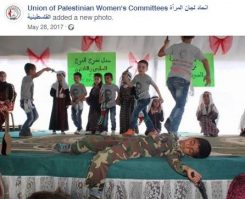
(Source: Union of Palestinian Women’s Committees, Facebook, May 29, 2017: https://www.facebook.com/upwcs/photos/ms.c.eJw9ztsJRFEIQ9GOBuMz9t~;YcLzo72IbRLpaZ3lQFJo~;DBTQsHDVBZVXCGXBRD1ZVguOKaIP6m0YbzRyToCF1DkxLpS9ItsX~_BW4gv3BbfSMZi1QIijojgXE~;HEbNBkQW5jX0dF~;M1M3CQ~-~-.bps.a.1642396675802133/1642397415802059/?type=3&theater)
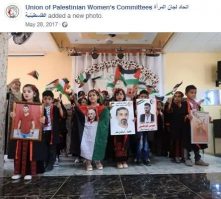
(Source: Union of Palestinian Women’s Committees, Facebook, May 29, 2017: https://www.facebook.com/upwcs/photos/ms.c.eJw9ztsJRFEIQ9GOBuMz9t~;YcLzo72IbRLpaZ3lQFJo~;DBTQsHDVBZVXCGXBRD1ZVguOKaIP6m0YbzRyToCF1DkxLpS9ItsX~_BW4gv3BbfSMZi1QIijojgXE~;HEbNBkQW5jX0dF~;M1M3CQ~-~-.bps.a.1642396675802133/1642398159135318/?type=3&theater)
Funding to UPWC
| Donor | Year(s) | Amount | Notes |
|---|---|---|---|
| Spanish Agency for International Development Cooperation (AECID) | 2020-2022 | €449,735 | Other implementing partners included Addameer, Defense for Children International – Palestine (DCI-P), and the Jerusalem Legal Aid and Human Rights Center (JLAC). |
| Basque Agency for Development Cooperation (AVCD) | 2019-2021 | €799,362 | Other implementing partners included Addameer, Defense for Children International – Palestine (DCI-P), and the Jerusalem Legal Aid and Human Rights Center (JLAC). |
| 2018-2019 | €184,252 | ||
| 2015-2018 | €800,764 | This project, part of the Kanan project, is implemented by six NGOs, including UPWC, Health Work Committees (HWC), Defense for Children International–Palestine (DCI-P), Alternative Information Center (AIC), and Bisan Center for Research and Development Association, all of which have reported ties to the PFLP terror group. | |
| European Union | 2017-2019 | €699,236 | The project included five Palestinian NGOs recipients, including Defense for Children International–Palestine (DCI-P), Land Research Center, and the Bisan Center for Research and Development Association. Both Defense for Children International – Palestine (DCI-P) and Bisan have apparent links to the PFLP. |
| Norway (via Norwegian People’s Aid) | 2016-2019 | NOK 50.5 million | The project is being implemented by 11 NGO partners, including the Union of Agricultural Works Committee (UAWC), a Palestinian NGO identified by Fatah as an official PFLP “affiliate” and by USAID as the “agricultural arm” of the PFLP. |
Appendix 1: UPWC Glorification of Terrorism
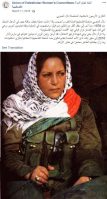
Post commemorating the terrorist Dalal Mughrabi. (Source: Union of Palestinian Women’s Committees, Facebook, March 11, 2018)
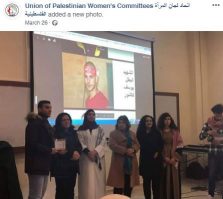
UPWC honors “families of martyrs.” The picture features a “martyr” wearing a PFLP bandana. (Source: Union of Palestinian Women’s Committees, Facebook, March 26, 2019)
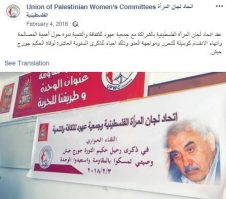
UPWC organized an event in commemoration of the PFLP’s founder George Habash. Source: Union of Palestinian Women’s Committees, Facebook, February 4, 2018)
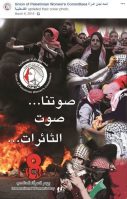
UPWC’s poster in honor of International Women’s Day: “Our voice is the voice of revolutions” (Source: Union of Palestinian Women’s Committees, Facebook, March 6, 2016)
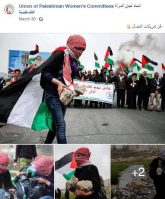
UPWC Facebook post: “They are the partners of struggle” (Source: Union of Palestinian Women’s Committees, Facebook, March 31, 2019)
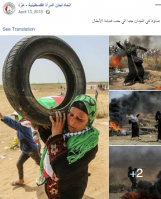
UPWC Facebook post: “Our women in the field side by side with our young heroes” (Source: Union of Palestinian Women’s Committees, Facebook, April 13, 2018)
Footnotes
- Bisan Center for Research and Development’s reported ties to the PFLP include: Izzat Abdulhadi, a former director of Bisan, is reported to be a PFLP member. According to the Palestinian organizations Samidoun – Palestinian Prisoner Solidarity Network and Addameer, Bisan Executive Director Eteraf Rimawi was arrested six times by Israeli forces between 1995 and 2014. Rimawi was reportedly sentenced for 16-months in prison and fined NIS 5,000 in 2000. During his detention in 2008, an Israeli military judge affirmed that “Eteraf was active in political activities related to the PFLP.”
- As of a September 2019 article in the National.
- As of a March 2018 UPWC article. An October 2019 PressTV article notes she is still involved with the organization.
- As of a June 2018 UPWC article.
- In May 2017, WATC inaugurated a youth center for girls in the town of Burqa, near Nablus. As reported by Palestinian Media Watch, the center was named after Dalal Mughrabi, a terrorist who in 1978 murdered 38 civilians, including 13 children. Funding for this building was provided by Norway, UN Women (United Nations Entity for Gender Equality and the Empowerment of Women), and Palestinian Authority Ministry of Local Government. Upon learning that the center had been named after a terrorist, the Norwegian government and the United Nations issued strong condemnations. Norwegian Minister of Foreign Affairs Børge Brende stated that “We have asked for the logo of the Norwegian representation office to be removed from the building immediately, and for the funding that has been allocated to the centre to be repaid.”
- As of a November 2018 Mundubat article.
- According to a January 2019 interview published in “noticias de Gipuzkoa.”
- As of a November 2018 Navarra.es article.
- As of an October 2018 post on “Coordinadoro Extremena De Organizaciones No Gubernamentales Para El Desarrollo” website and a November 2017 UPWC Facebook post.
- According to an October 2019 article in Arabic language media.
